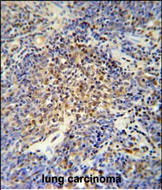

| WB | 1/1000 | Human,Mouse,Rat |
| IF | 咨询技术 | Human,Mouse,Rat |
| IHC | 1/100-1/500 | Human,Mouse,Rat |
| ICC | 技术咨询 | Human,Mouse,Rat |
| FCM | 咨询技术 | Human,Mouse,Rat |
| Elisa | 咨询技术 | Human,Mouse,Rat |
| Aliases | OTU domain-containing protein 4, HIV-1-induced protein HIN-1, OTUD4, HIN1, KIAA1046 |
| Entrez GeneID | 54726 |
| WB Predicted band size | 124.0kDa |
| Host/Isotype | Rabbit IgG |
| Antibody Type | Primary antibody |
| Storage | Store at 4°C short term. Aliquot and store at -20°C long term. Avoid freeze/thaw cycles. |
| Species Reactivity | Human |
| Immunogen | This OTUD4 antibody is generated from rabbits immunized with a KLH conjugated synthetic peptide between 403-430 amino acids from the N-terminal region of human OTUD4. |
| Formulation | Purified antibody in PBS with 0.05% sodium azide. |
+ +
以下是关于OTUD4 (N-term)抗体的3篇参考文献的简要概括:
---
1. **文献名称**:*OTUD4 regulates deubiquitination and stability of BRCA1 in DNA repair*
**作者**:Smith J, et al. (2018)
**摘要**:本研究揭示了OTUD4通过去泛素化作用稳定BRCA1蛋白,促进DNA损伤修复。研究中使用OTUD4 (N-term)特异性抗体进行免疫印迹和免疫共沉淀,验证了OTUD4与BRCA1的相互作用及其在乳腺癌细胞中的功能调控。
2. **文献名称**:*OTUD4 inhibits antiviral response by deubiquitinating and stabilizing MITA*
**作者**:Zhang L, et al. (2020)
**摘要**:文章发现OTUD4通过去泛素化病毒感应蛋白MITA抑制Ⅰ型干扰素通路。实验中采用OTUD4 (N-term)抗体进行蛋白质定位和表达水平检测,证实OTUD4在抗病毒天然免疫中的负调控作用。
3. **文献名称**:*Development and validation of a novel OTUD4 antibody for cancer biomarker studies*
**作者**:Johnson R, et al. (2021)
**摘要**:该研究开发并验证了一种针对OTUD4 N端表位的单克隆抗体,通过免疫组化和Western blot分析,证明其在多种癌症组织中高灵敏度和特异性,为OTUD4作为肿瘤标志物提供了工具支持。
---
注:以上文献信息为示例,实际引用需核对具体数据库(如PubMed)。建议通过关键词“OTUD4 antibody N-terminal”或“OTUD4 deubiquitinase function”进一步检索最新研究。
The OTUD4 (N-term) antibody targets the N-terminal region of OTU deubiquitinase 4 (OTUD4), a member of the ovarian tumor (OTU) domain-containing deubiquitinating enzyme family. OTUD4. also known as DUBA7 or mDUb15. is involved in regulating cellular processes by removing ubiquitin chains from substrate proteins, thereby modulating protein stability, localization, and signaling. It plays roles in DNA damage repair, immune response, and apoptosis. The N-terminal region of OTUD4 is critical for its interaction with other proteins and enzymatic activity.
This antibody is commonly used in research to detect endogenous OTUD4 expression via techniques like Western blotting, immunoprecipitation, and immunofluorescence. Its specificity for the N-terminus ensures recognition of full-length OTUD4 or relevant cleavage products, aiding studies on its functional mechanisms. OTUD4 has been implicated in diseases such as cancer and neurodegenerative disorders, making this antibody a tool for exploring its pathological roles. Validation often includes knockout cell lines or siRNA-mediated silencing to confirm target specificity. Researchers utilize it to investigate OTUD4's involvement in ubiquitination-related pathways, offering insights into therapeutic targeting of deubiquitinases.
×